A shot at making history
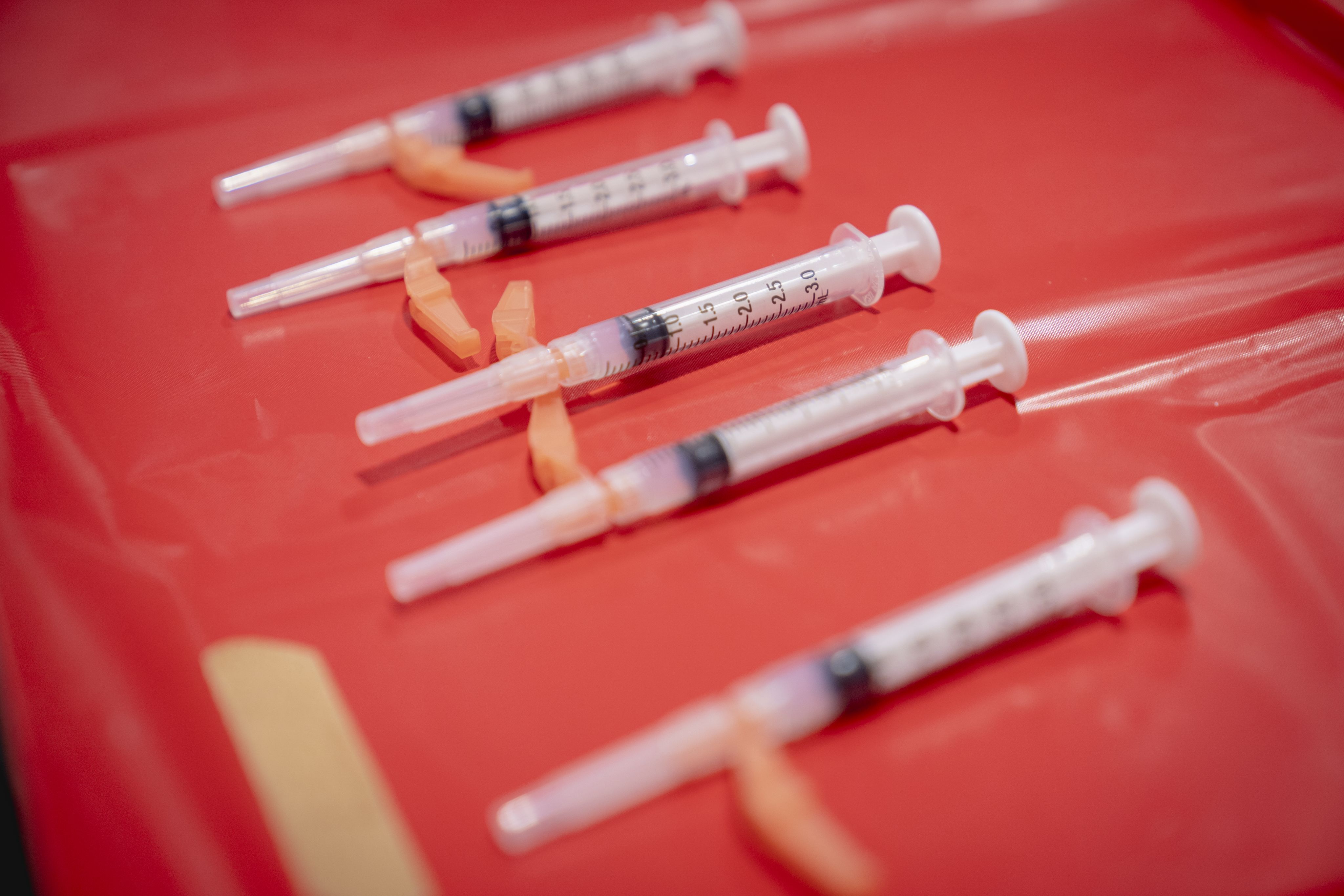
When COVID-19 vaccines became available in Philadelphia, the Temple community was ready, swiftly organizing to inoculate as many people as quickly and as efficiently as possible.
Bright and early at 8 a.m. on the day before Thanksgiving of 2021, in the midst of Temple’s fall break, Jennifer Le, Samantha Tom and Gabriela Riano, all Class of 2023, gathered at the Vaux Community Health Center at the corner of 23rd and Master streets. The trio of nursing students headed into the clinic, where they spent the morning administering COVID-19 vaccines to Temple’s neighbors, as they have been doing almost daily since May, when they first learned how to draw up and administer an injection.
Under the leadership of Laura A. Siminoff, dean of the College of Public Health (CPH), who has played a key role in positioning the college to address the public health needs of the community related to the COVID-19 pandemic, the college operated a vaccination program for much of the last year. Vaux, the College of Public Health’s community health center, has served as the hub for vaccinations. The center is open weekdays to individuals seeking vaccinations and boosters. During the spring and summer months, the college also served the city by operating roving vaccine events, staffed by CPH faculty and students.
“An email had been sent around to nursing students from our instructors asking for volunteers, and I jumped at the opportunity to participate,” said Le. “This is a unique moment in history and it means a lot to me to be able to provide this protection to people who have limited access to healthcare.”
Tom agreed: “Many of the people who come out to the clinics for the vaccines are feeling reluctant and a little frightened even,” she said. “It’s awesome to be able to talk to them face to face and clear up any confusion or misinformation they may have heard.”
One patient in particular stands out in Tom’s memory. “A woman who was overcoming substance use disorder and was in the midst of restarting her life was so grateful to get the vaccine because, she said, she didn’t want anything to stand in the way of her recovery,” Tom shared. “She kept thanking us; it was heartwarming and eye-opening at the same time.”
Working at the clinics gave the students a unique opportunity to gain hands-on experience on the frontlines of a global health crisis. “I wanted to help out in any way I could,” explained Riano. “It’s amazing to see how at the clinics everyone has a role to play, everyone works together—social workers, pharmacists, even communications professionals. We functioned at a very high level as a cooperative team.”
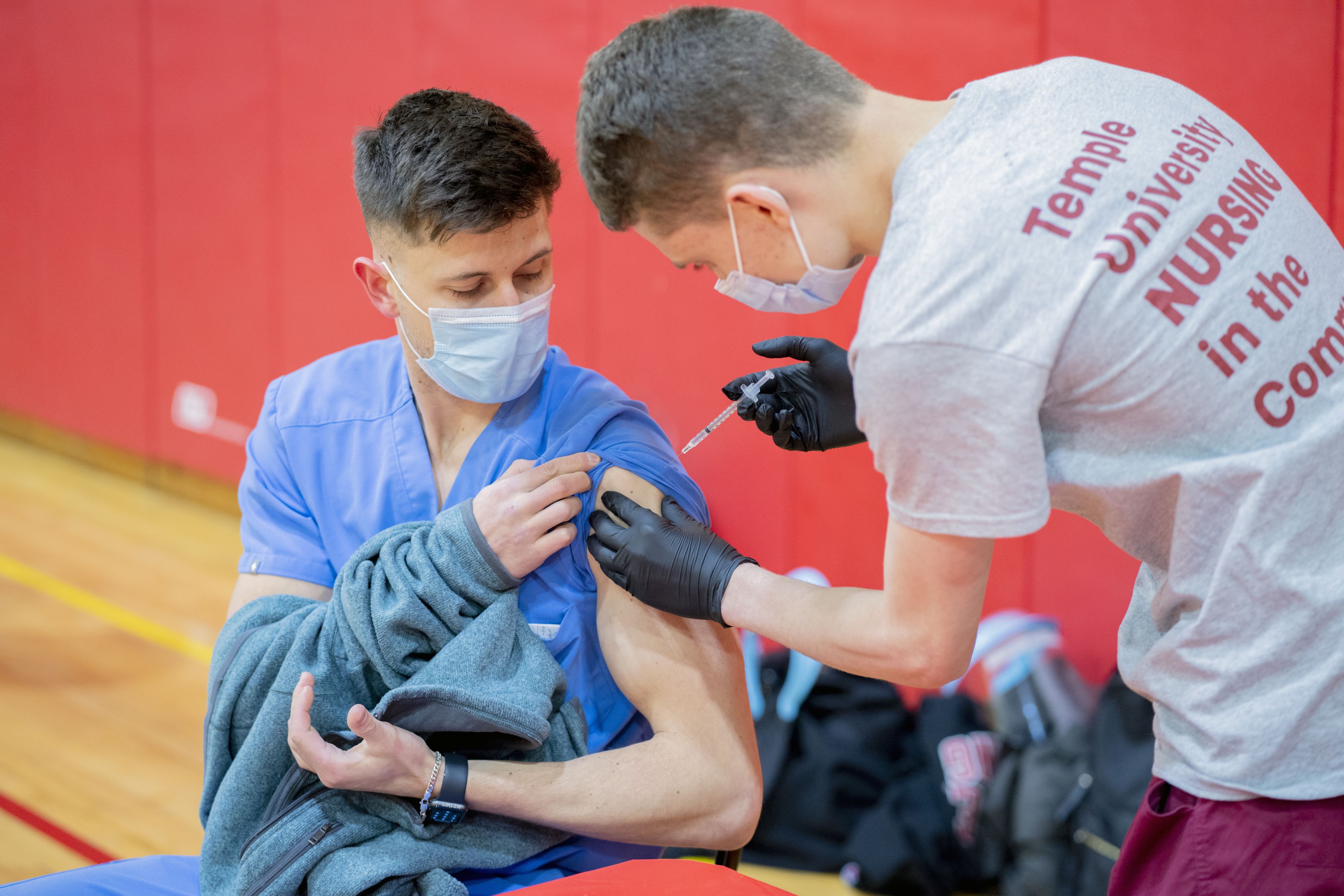
Every minute counted
Once the vaccines became available, Siminoff knew there was no time to lose in getting as many people as possible vaccinated quickly.
“We knew that the most economically disadvantaged people were among the most vulnerable,” she said. “So we aimed to bring vaccination opportunities to those people where they lived and worked.”
Since last spring, CPH played a leading role in setting up COVID-19 vaccination sites in some of Philadelphia’s most vulnerable communities. With over $1.1 million in grant funding from the city of Philadelphia, CPH has worked with more than a dozen community organizations—including the Philadelphia Housing Authority, Strawberry Mansion Community Development Corp., the Indochinese American Council, the Ahmadiyya Muslim Community, Columbia North YMCA, Prevention Point, Bethel Presbyterian Church, the Church of the Advocate, the Episcopal Diocese of Philadelphia and the Welcoming Center for New Pennsylvanians—to give thousands of people in medically underserved neighborhoods easy access to vaccinations. They provided trained staff to deliver vaccines and manage the sites, while offering resources to inform community residents about the vaccines, answer questions and build trust. This work, originally funded through December 2021, recently received funding to extend the work.
To distribute the immunizations on a large scale, the college developed the RapidVax vaccine delivery workflow. This protocol, the brainchild of Susan VonNessen-Scanlin, CPH’s associate dean for interprofessional education and clinical affairs, allowed Temple’s teams to safely deliver up to 50 vaccinations per hour. The advantages of the RapidVax protocol are its flexibility, mobility and cost effectiveness. It doesn’t require a lot of space, such as a convention center, and can be implemented in churches and neighborhood centers. As well, the workflow can be easily scaled up or down to accommodate the number of people being vaccinated and the available square footage, and it can be carried out in mobile units to bring immunizations directly to the homes and workplaces of those who have limited access to transportation.
As the availability of vaccine doses ramped up starting in December of 2020—and with CPH at the helm—faculty, staff and students in a range of disciplines began fanning out across campus and into the many neighborhoods of Philadelphia, volunteering their time and energy to help during this unprecedented public health crisis. Indeed, nearly all of the health-related departments, schools and colleges at Temple, including medicine, athletic training, nursing, social work, public health and pharmacy, jumped at the chance to participate in this massive undertaking.
“Together, we are presenting a unified front in the community,” said VonNessen-Scanlin. “We have seen a shift in terms of hesitancy, and we are still working hard to get as many people vaccinated as possible and to administer boosters as well. The work is not over.”
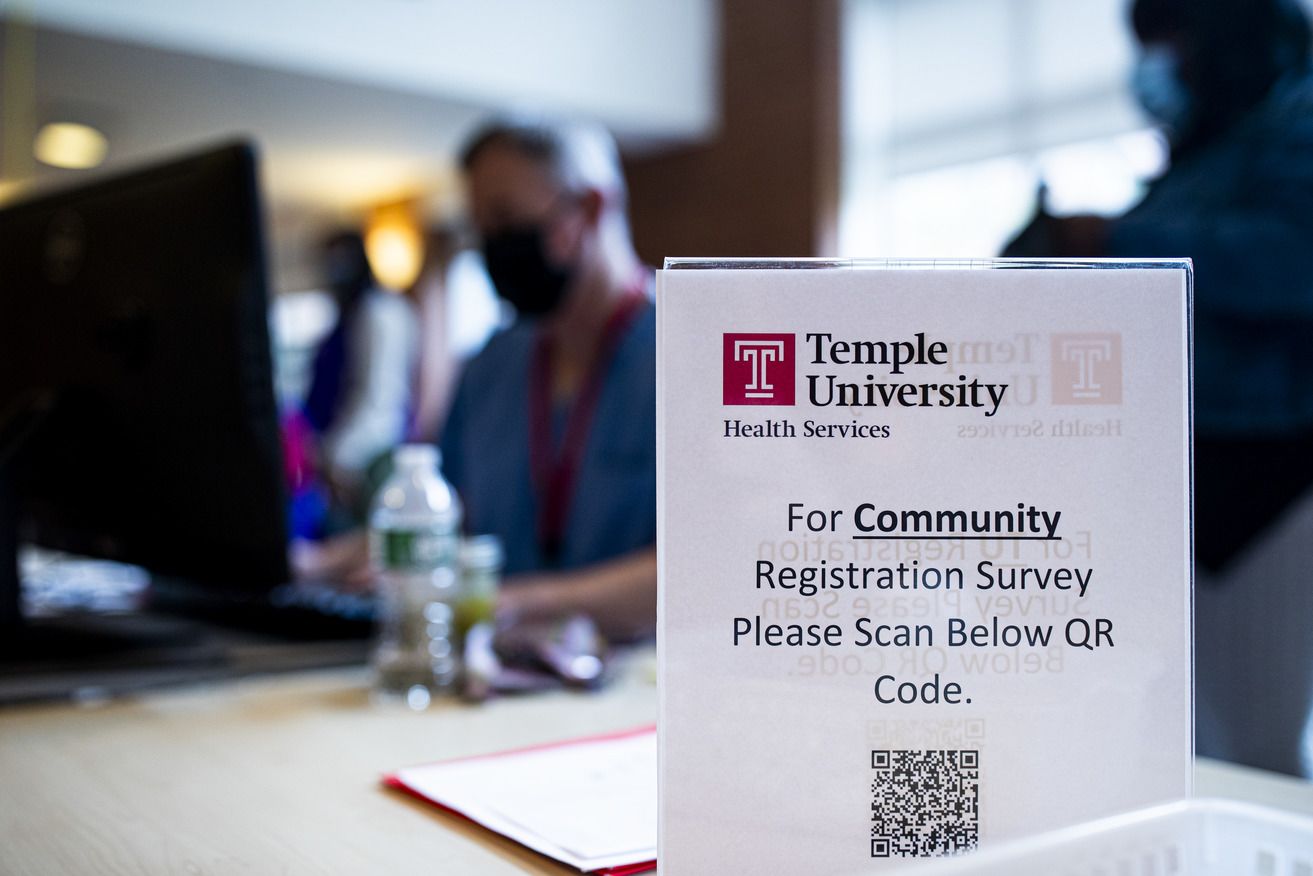
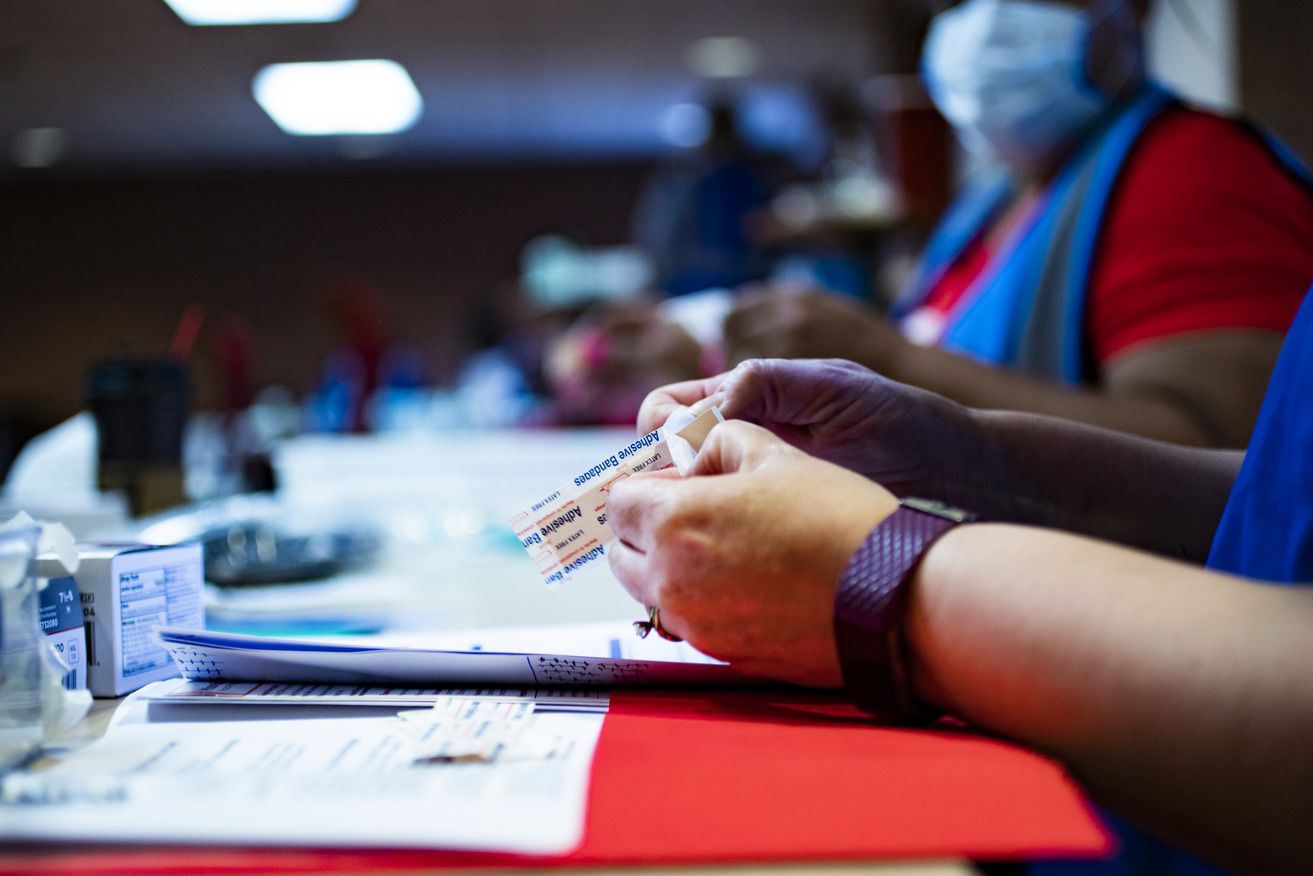
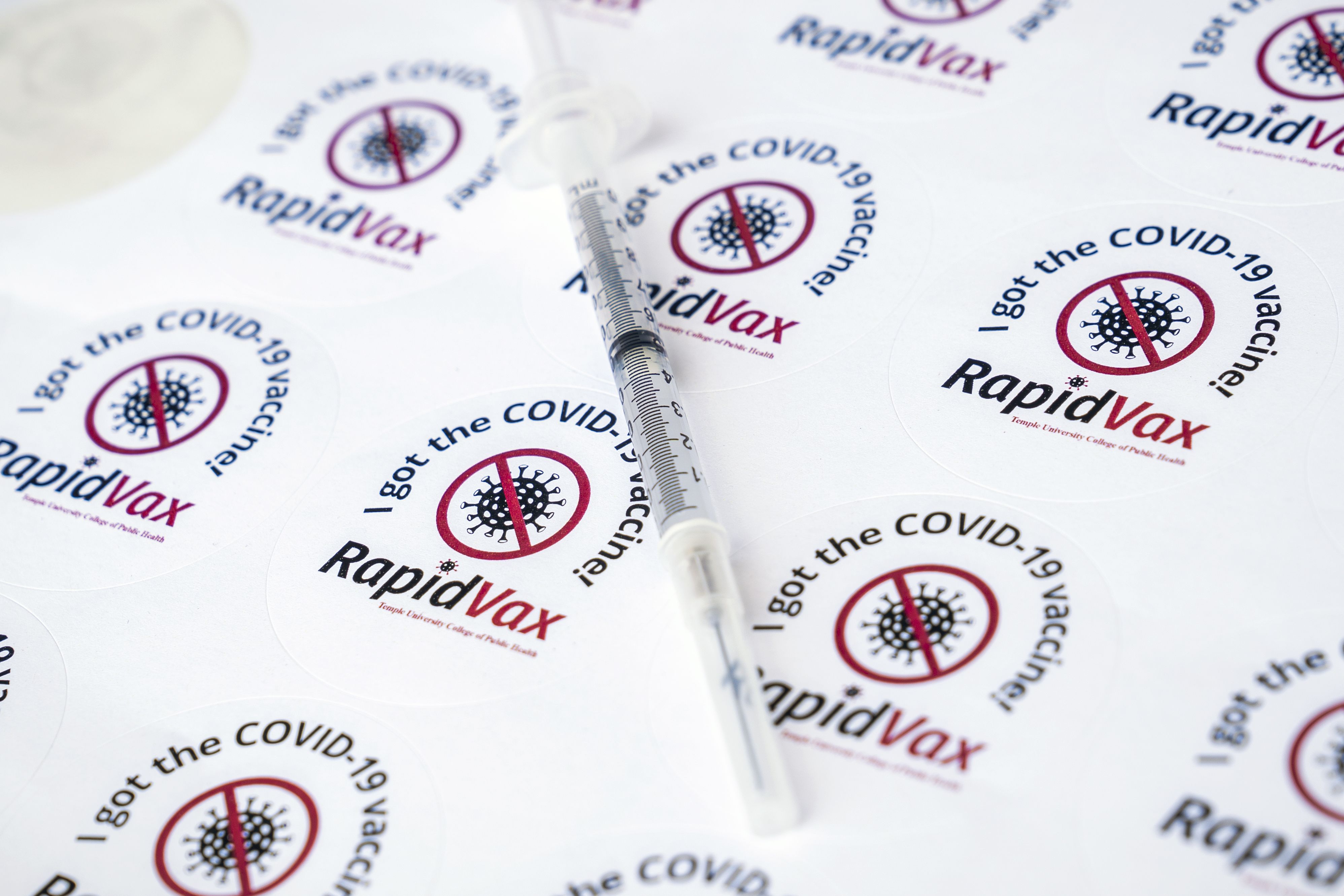
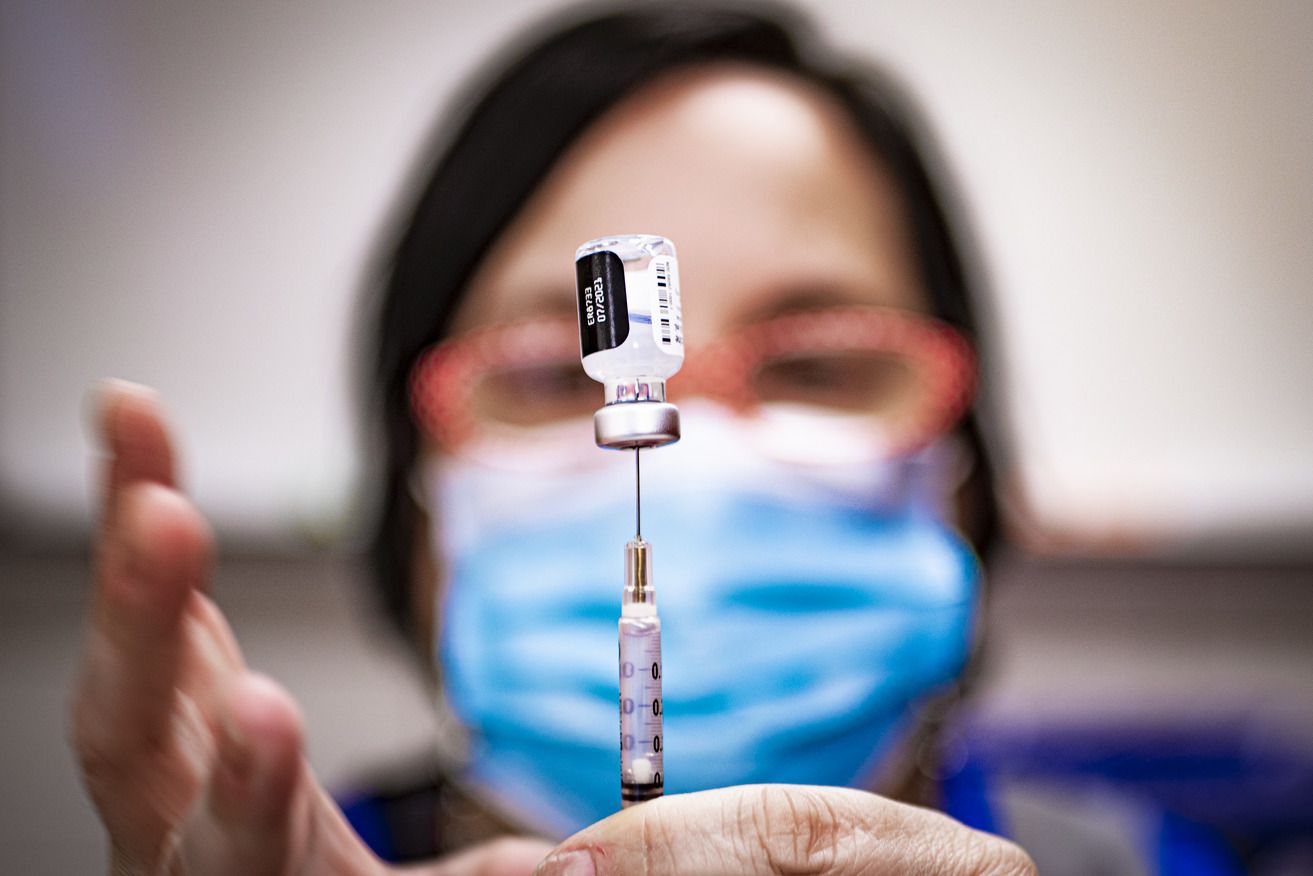
Students step up
One unique component of this mobilization was how closely students were involved in the endeavor, applying their academic training and passion for their chosen fields to meet this historic moment in real time.
Echoing the sentiments of Le, Riano and Tom, many of these students expressed a strong desire to play a proactive part in ending COVID-19.
Appearing in an article written for the Lewis Katz School of Medicine newsroom, fourth-year medical student Christopher Rakay put it plainly: “What I want to do is help people and alleviate disease and suffering. This was a prime opportunity to do just that.”
Fourth-year pharmacy student Sarah Bruzek volunteered at Temple vaccination clinics and served on the board of the university’s vaccination task force committee as a student liaison.
“Just being able to have a part in ending a worldwide pandemic, which so many people have died from … it’s very historic,” she says. “I was very proud to be a part of it, especially as a student. It felt like I was really making a difference.”
On Dec. 16, 2020, when the first doses of the Pfizer/BioNTech vaccines were released, student volunteers from the medical school and nursing students from the College of Public Health were some of the first healthcare workers in the city to administer the shot. They volunteered for a clinic set up in the auditorium of Temple University Hospital.
Joelle Hargraves, undergraduate program director and associate professor for nursing at CPH, volunteered with three junior nursing students on the first vaccination day. After an information session and orientation, the students rotated through a variety of roles, doing everything from screening patients to actually giving the shots.
“They’d already learned about vaccines and participated in clinics within Student Health, but the COVID vaccine was new, so everyone was learning together,” Hargraves said.
“I think [this experience] shows the important role of nursing within the whole interprofessional medical team,” Hargraves said. “The students were able to give back to a community of providers that they work with, and I think that is very important.”
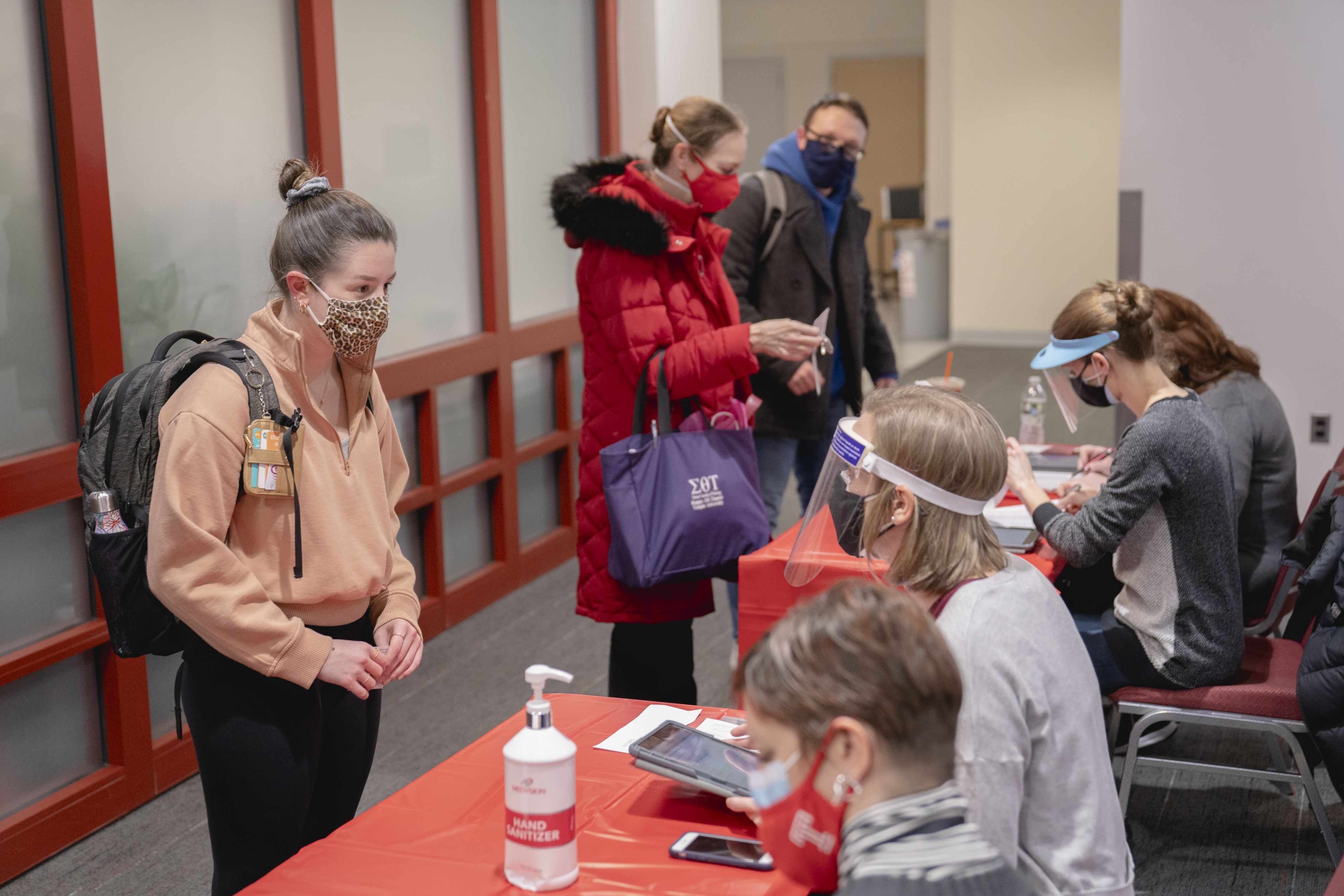
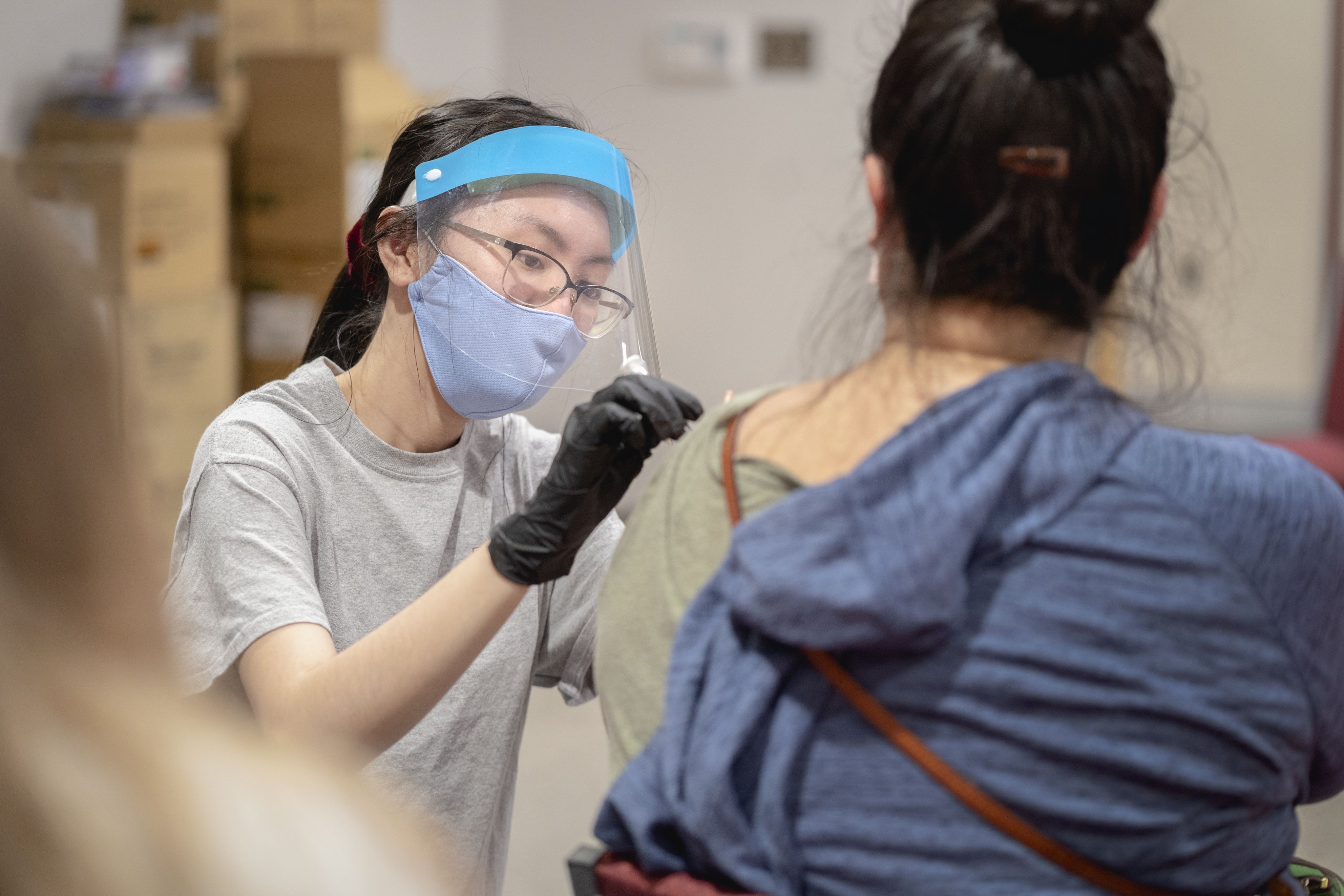
Called on to help
Another group of students who were heavily involved with both on-campus and community-facing vaccinations were those from Temple’s School of Pharmacy. A waiver issued by Pennsylvania Governor Tom Wolf on Dec. 8, 2020, allowed supervised pharmacy students and interns to administer vaccines, a notable departure from the previous rules.
The School of Pharmacy jumped into action, creating training opportunities for every single student in the program. The charge was led by Charles Ruchalski, clinical professor of pharmacy practice, who coordinated the 20-hour, schoolwide instruction on giving live, in-person injections and CPR training. In the past, only pharmacy students nearing graduation were trained on performing vaccinations, but now 100% of the school’s student body is trained, even first-year students.
“It was exciting and empowering,” Ruchalski remembered. “We’re going through the biggest health crisis of our lifetime, and for the state of Pennsylvania to recognize that pharmacy students are skilled and capable enough to be on the front lines to vaccinate—it was historic.”
He credits his school’s overall COVID-19 vaccination mobilization to an immense amount of planning and logistical organization.
“We had to do it methodically, it had to be well thought out with all the right training and licensing procedures,” Ruchalski said. “We had weekly meetings among the Pharma/Vax Group addressing concerns and issues about how to roll people out in different locations.”
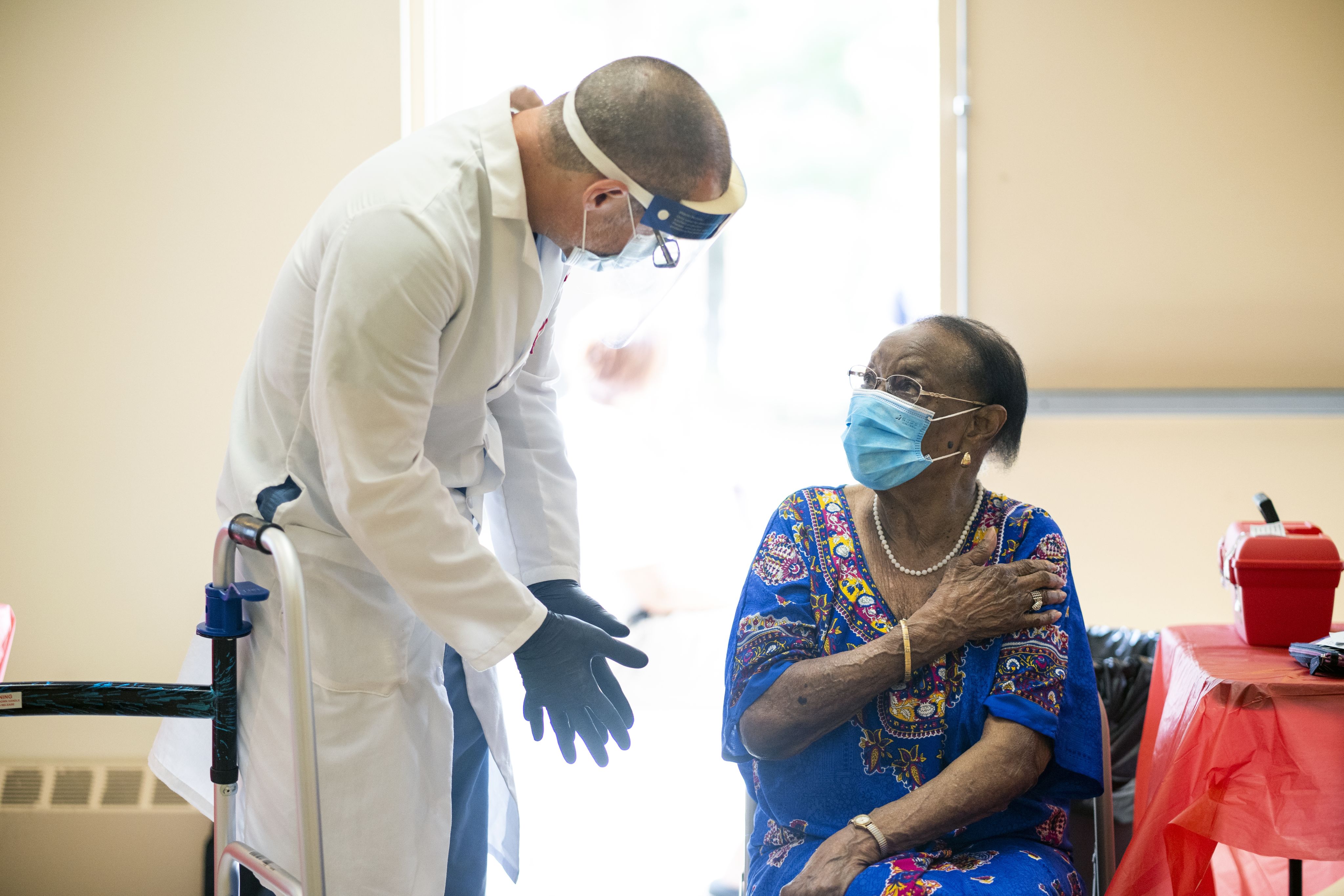
One patient at a time
Hong-Dao Tang was one of the pharmacy students to volunteer using her new vaccination training. In mid-April 2021, she was doing her last clinical rotation before graduation, a requirement of pharmacy students to work for brief periods of time in different hospital departments. She and a handful of other students were completing their rotations in Temple University Hospital’s neurology department, and were given the option to instead use that time to vaccinate people. She quickly agreed and participated in a two-day drive on Temple’s Main Campus, which was open to students, employees and neighbors.
“The Main Campus event was very well organized,” she recalled. “For the students and faculty who came to volunteer, everything was very well prepared.”
Multiple vaccination stations were set up so that after people were checked in, they could come up to a chair, have their name and birthdate verified, and choose which arm would receive the vaccine. Pharmacists in a back room safely defrosted and drew up the vaccine into the syringes, which were packed in coolers to refill each station. Pharmacy students were supervised by instructors as they administered the vaccine to each person.
Providing counseling for those being vaccinated around needle fear or misinformation about the vaccination side effects was a big part of the job. If a patient seemed particularly on edge, Tang told them not to look at the needle, and then tried to distract them by asking questions about their major or field of study. If people referenced conspiracy theories, like the vaccine containing a microchip, or more serious misconceptions or misinformation, she’d try to quickly educate them.
“If people said things like, ‘This is going to give me the virus,’ I’d explain that there is no live virus in it, this is just a protein that’s helping your immune system learn to fight the virus,” she said.
Austin Murphy, another pharmacy student who volunteered during vaccination clinics, reiterated the importance of providing encouragement and education to those receiving the vaccine.
“Counseling is a monumental part of being a pharmacist and a huge emphasis in our program, so I had those personal conversations,” he said. “If I came across someone who really didn’t want to do it, I’d say, ‘You’re doing the right thing, and whether you can see it or not, you’re helping to protect other people.’”
Jennifer Shif, another fourth-year pharmacy student, spent every Friday in February and March volunteering at vaccination clinics at Temple University Hospital. She’d originally planned to just volunteer once, but kept returning to help more.
“It was my first time having direct patient care and I felt like I was giving back to a community disproportionately affected by the pandemic … it felt good,” she says. “I was really able to see the role and scope of pharmacists.”
Lawrence Carey, assistant dean for assessment and quality and clinical professor of pharmacy practice, said that as he supervised students throughout the vaccination clinics, he observed a marked shift in their confidence and self-perception.
“A light went on, so to speak, where they realized the contributions they’re really making are with one patient at a time,” he noted. “They’re on the front lines, vaccinating and monitoring patients … and have really notched up their knowledge of public health, and their ability to educate, counsel, and contribute in a meaningful way to the public health of Philadelphia and Pennsylvania at large.”
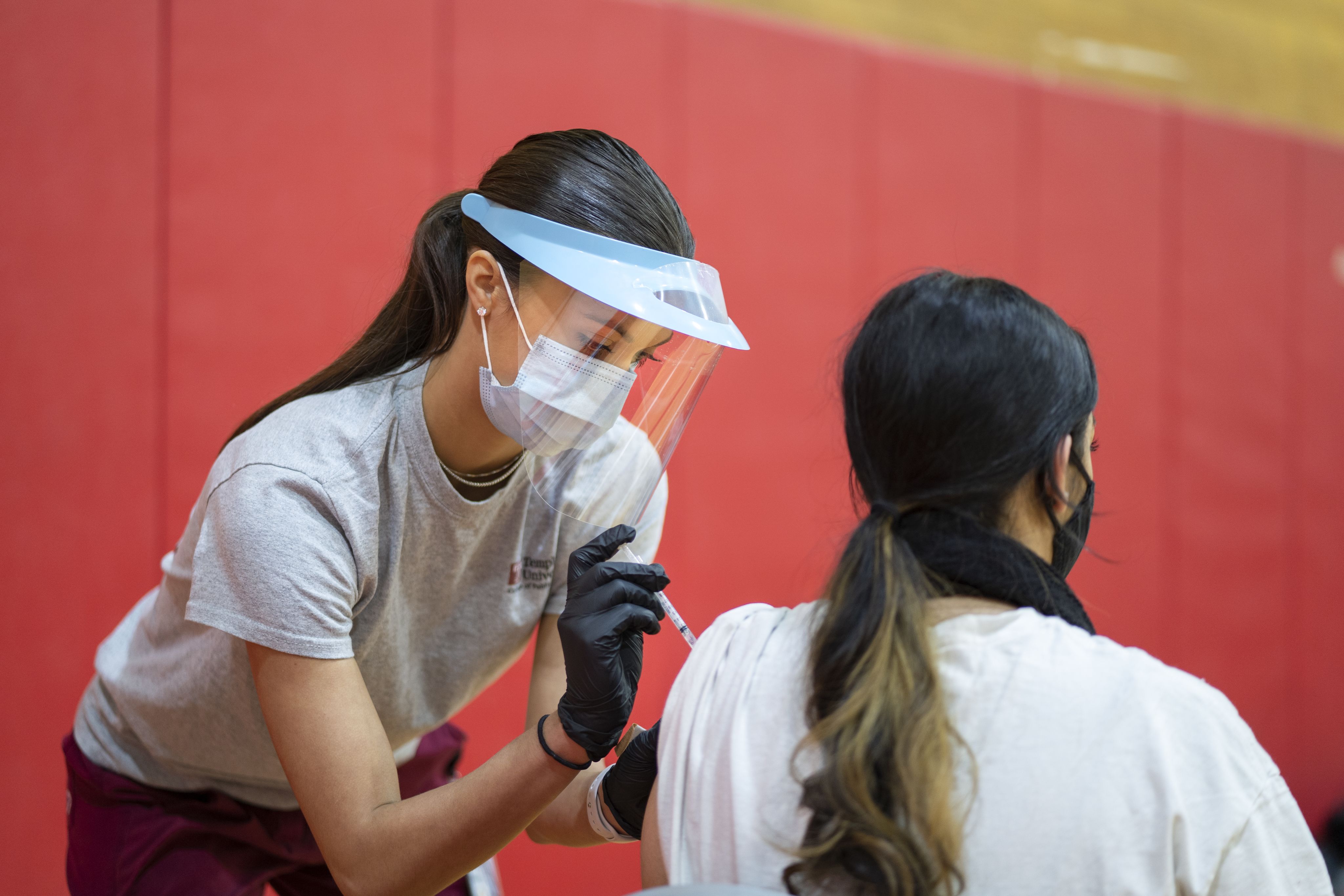
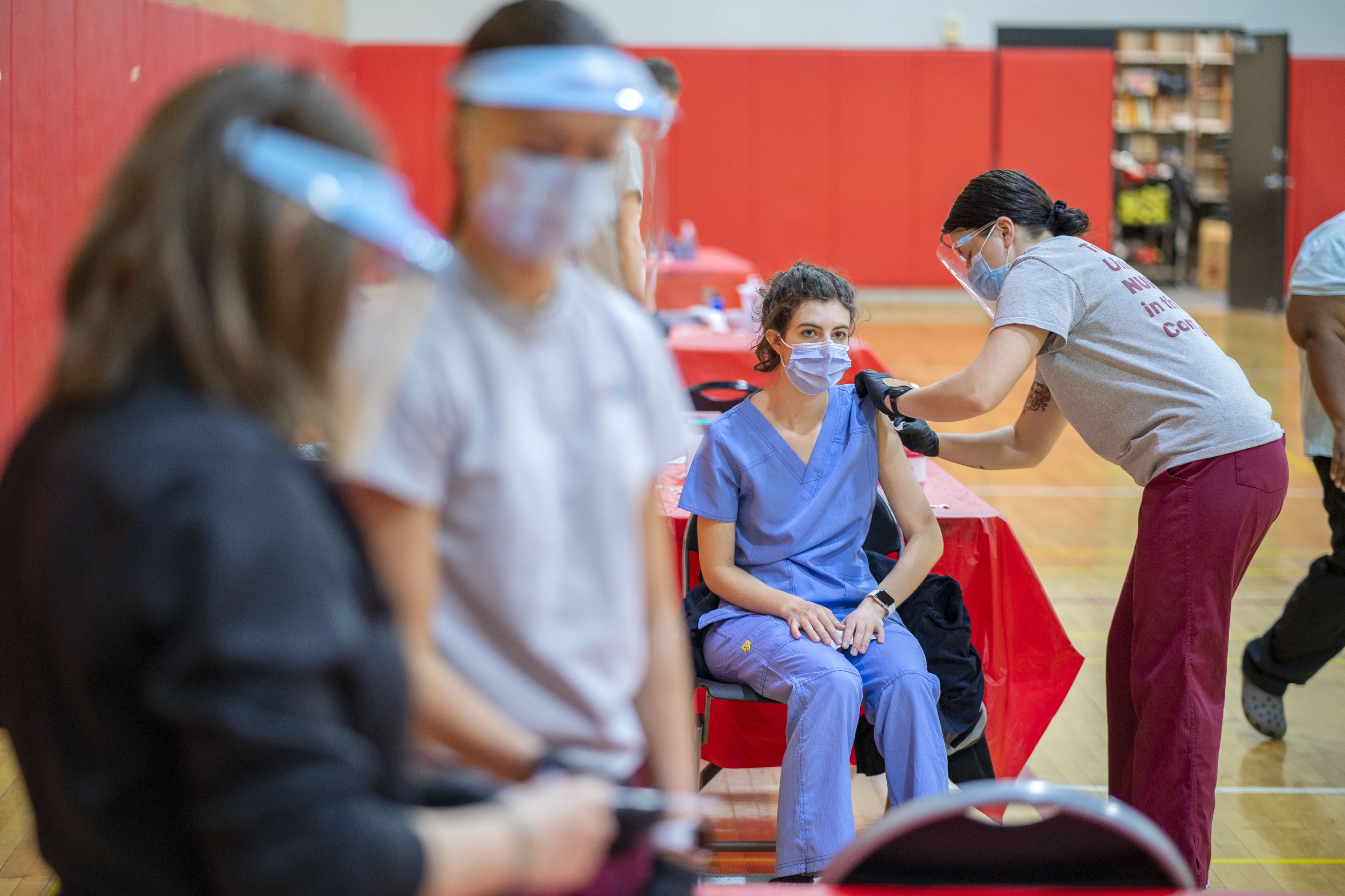
Front and center
The pandemic has thrust nursing and other public health professions into the public eye. And it’s led to an increase in enrollment in these fields; the desire by prospective students to join the ranks of these front-line heroes is at an all-time high.
Nursing school applications at Temple increased about 15% this fall, according to Michael Usino, assistant dean of admissions and enrollment management in Temple’s College of Public Health.
“At first we were concerned that when students saw what was happening in hospitals on the news and in social media, they might be dissuaded from pursuing nursing as a career,” Usino said. “It turns out, however, that this generation of students is more inspired than ever to actually serve their communities.”
Temple has also seen an increase in applications for first-year students enrolled in its master’s of public health program, particularly among those with interest in epidemiology and behavioral sciences.
“The pandemic has cast a spotlight on what public health is and why it’s so important,” said Laura A. Siminoff, dean of the College of Public Health. “I’m heartened and gratified to see young people answering the call.”
Lots (and shots) of love
The corner of Ruth and Clearfield streets in North Philadelphia, affectionately known as the Love Lot, has become an important intersection over the past 18 months. With the support of a number of local organizations, it has offered meal distribution, COVID-19 testing, stimulus check assistance and more. In the spring of 2021, the Love Lot also became the site of twice-weekly community RapidVax COVID-19 vaccination clinics, through a partnership between Temple’s College of Public Health; the School of Pharmacy; and Prevention Point Philadelphia, a local nonprofit promoting health, empowerment and safety for communities affected by drug use and poverty.
Led by Sarah Bauerle Bass, associate professor and director of the Risk Communication Laboratory at Temple’s College of Public Health, event organizers used market research methods like surveying diverse neighborhoods, and deploying advertising and public relations strategies to craft compelling public health messaging and, ultimately, bring folks into the clinic for their shots.
“I call it ‘not the kitchen sink’ method,” said Bass, who was recently named the 2021 winner of the American Public Health Association’s Everett M. Rogers Award, a national honor for outstanding contribution to public health communication. “In public health we tend to give people all the facts. But in marketing, we home in on a few messages to persuade people.”
Bass and her team hired Temple’s student-run advertising agency, Diamond Edge Communications, to craft a logo that was developed and refined based on community input and templates for materials like flyers, social media ads, branded fact sheets and selfie backgrounds to educate and convince specific groups to get vaccinated.
Every Tuesday and Thursday last spring, the Love Lot provided vaccination opportunities to neighbors, or just a place to come talk through the decision with student and community ambassadors.
“It’s really coming to where people are, physically but also emotionally and mentally, as they make that vaccination decision,” Bass said. “The more we are there, the more trust the community has that we are there for the right reasons.”
Temple’s credible messenger campaign
The phrase “vaccine hesitancy” entered the zeitgeist as soon as the nationwide COVID-19 vaccine rollout began. There are numerous, and sometimes very personal, factors that can affect people’s levels of trepidation.
For members of the Black and Latinx communities, this hesitation grew from a general distrust of healthcare altogether—the result of a long history of racism in healthcare systems and decades of unethical medical research among people of color.
Stefanie Murphy, senior director of strategic and service line marketing at Temple Health, understood the challenges the lack of trust posed.
“As the COVID vaccines began moving through the emergency use authorization process, we recognized that Temple Health would need to play a key role in getting our community vaccinated,” said Murphy.
Knowing they would have to develop an effective way of reaching these historically marginalized groups, Murphy reached out to Francesca Reynolds, Temple’s senior director of marketing, seeking a partnership that would extend beyond the health system.
“Our research confirmed our suspicions: there was deep distrust of not only the COVID-19 vaccine, but also of ‘big government,’ medical centers and of Temple among our neighbors who were concerned about the vaccine’s efficacy as well as possible long-term side effects,” said Reynolds.
Murphy and Reynolds looked to the work of Kathleen Reeves, chair and professor of urban bioethics and population science and director of the center for urban bioethics at the Lewis Katz School Medicine, and Steve Carson, president and CEO for the center of population health at Temple Health, for an approach on which Temple could model a communications campaign. The pair had been seeing success partnering with community organizations to deliver information on health and safety practices related to the virus.
So Murphy, Reynolds and their colleagues at Temple Health, the Katz School of Medicine and the university’s Office of Strategic Marketing and Communications implemented a plan that engaged similar grassroots tactics.
“We asked local community leaders and influencers—the people who everyone in the neighborhood knows, trusts and looks up to—to be the voices who delivered the message about the importance of getting vaccinated,” Reynolds explained.
Then the team developed fact sheets translated into six languages that could be delivered door to door and produced ads for placement on bus shelters and billboards, on social media and on the radio.
In the ads, we hear from Aaron McKie, Temple men’s basketball coach; Quetsy Lozado, vice president of community organizing at local nonprofit Esperanza; Greg and Bernice Bonaparte of North Philadelphia’s Berean Presbyterian Church, and many more, all sharing their individual reasons for choosing to get the vaccine.
“Drawing on the proven strategies employed by population health experts, we were able to develop a campaign that truly spoke to and resonated with the audiences we were trying to reach,” said Meaghan Bixby, Temple’s director of content strategy. “We were able to assuage people’s fears by letting them know how others just like them had overcome their own reservations.”
A community-facing website provides comprehensive resources, like links to upcoming COVID-19 vaccination clinics, information about vaccine side effects and research findings, and dozens of testimonials from diverse “credible messengers” who offer reassurance by telling their personal COVID-19 vaccination stories.
Visitors to the site will meet, among others, Frank and Theresa Rucco, a local couple who share their relief at being able to see family again and return to work feeling safer being around others. Bob Cavanaug, a Vietnam Veteran, who describes his joy at being able to play with his grandchildren again. Tamara Cobb, a community health worker at Temple, says she was initially hesitant to get the vaccine. “How can this be a good thing for me … and brown and Black people?” she remembers wondering. Ultimately, the fear of getting COVID-19 and concerns for her family’s safety convinced her to get the vaccine.
“I urge people to get the vaccine,” Cobb goes on to say in her testimonial. “Because to me, at this point, it’s life or death. And I choose life.”
Ultimately, the approach has turned out to be a gamechanger for how Temple Health engages with our neighbors.
“It has opened doors and enabled us to develop additional relationships with community partners we never had before, and this can hopefully help us deliver critically needed health information to the community long into the future,” said Murphy.
All systems go
On Feb. 9, 2021, Julie Drzymalski, director of the industrial and systems engineering program at Temple’s College of Engineering, published an opinion piece in The Philadelphia Inquirer titled, “How basic engineering concepts could help solve Philly vaccination problems.”
In the article, she urged a restructuring of the city’s vaccination strategy, using her field’s comprehensive and integrative approaches to strengthen public trust and institutional transparency in the midst of a shaky start to the city’s COVID-19 vaccination efforts.
She cited the scandal caused when the city cut ties with Philly Fighting COVID, a start-up that the city partnered with in January 2021 to create mass vaccination sites. The start-up was soon exposed as having a number of serious problems, including a privacy policy that would have allowed the sale of patient data. The backlash from this controversy put the public opinion of the city’s competency on shaky ground, and in the wake of that, Drzymalksi posed the question: “What steps can cities like Philadelphia take right now to mitigate as many issues as possible and maximize the number of people who get vaccinated?
She brought her expertise as a systems engineer to the table with three key suggestions for helping the city to get back on track: human systems integration, real-time monitoring and public feedback. This “holistic yet relatively simple approach,” she argued, provided a blueprint to achieve equitable distribution of the vaccine, use data to improve efficiency and effectively spread information across the population.
She concluded the op-ed with the pragmatic assertion that, “While we cannot go back and start from scratch, we can take best practices from what we do know how to do well and apply them as best we can under the given circumstances.”

